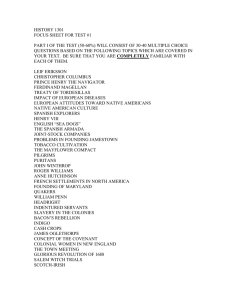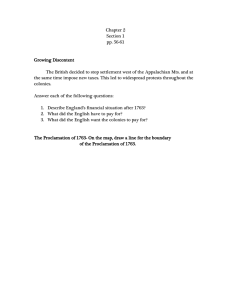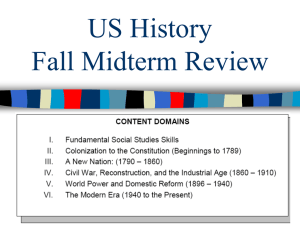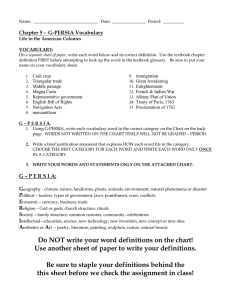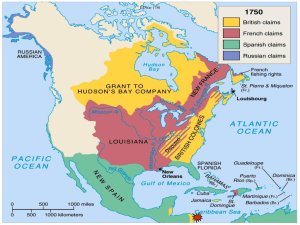Homework Sheet Summer Reading Read pages 80
advertisement
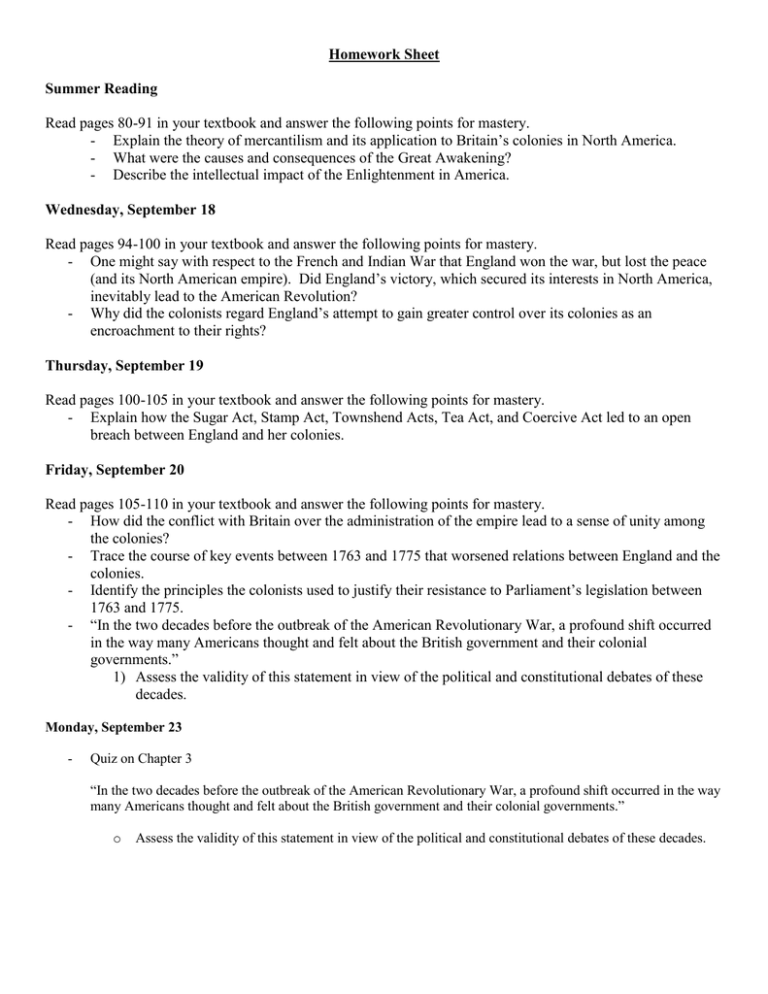
Homework Sheet Summer Reading Read pages 80-91 in your textbook and answer the following points for mastery. - Explain the theory of mercantilism and its application to Britain’s colonies in North America. - What were the causes and consequences of the Great Awakening? - Describe the intellectual impact of the Enlightenment in America. Wednesday, September 18 Read pages 94-100 in your textbook and answer the following points for mastery. - One might say with respect to the French and Indian War that England won the war, but lost the peace (and its North American empire). Did England’s victory, which secured its interests in North America, inevitably lead to the American Revolution? - Why did the colonists regard England’s attempt to gain greater control over its colonies as an encroachment to their rights? Thursday, September 19 Read pages 100-105 in your textbook and answer the following points for mastery. - Explain how the Sugar Act, Stamp Act, Townshend Acts, Tea Act, and Coercive Act led to an open breach between England and her colonies. Friday, September 20 Read pages 105-110 in your textbook and answer the following points for mastery. - How did the conflict with Britain over the administration of the empire lead to a sense of unity among the colonies? - Trace the course of key events between 1763 and 1775 that worsened relations between England and the colonies. - Identify the principles the colonists used to justify their resistance to Parliament’s legislation between 1763 and 1775. - “In the two decades before the outbreak of the American Revolutionary War, a profound shift occurred in the way many Americans thought and felt about the British government and their colonial governments.” 1) Assess the validity of this statement in view of the political and constitutional debates of these decades. Monday, September 23 - Quiz on Chapter 3 “In the two decades before the outbreak of the American Revolutionary War, a profound shift occurred in the way many Americans thought and felt about the British government and their colonial governments.” o Assess the validity of this statement in view of the political and constitutional debates of these decades. America in the British Empire Directions: Read pages 80-110. Inform the reader of several of the most important facts about each item. If it is an event, describe what happened and how it came out; if it is a person, detail the most important facts that this person should be remembered for. This should take 3-4 sentences. After finishing the sentence note both the source and note page number(s). Mercantilism - Favorable Balance of Trade - Navigation Acts - Salutary Neglect - Impact? Colonies - Religion o How religion shaped colonial societies o First Great Awakening Jonathan Edwards and George Whitefield New Lights and Old Lights Impact - Culture o Impact of European Thinkers John Locke Philosophes American Enlightenment Thinkers Emergence of a National Character - Unifying Forces - Divisive Forces Anglo-French Wars - Impact on Colonies French and Indian War - Albany Plan of Union - Treaty of Paris (1763) - Who won? - Impact Reorganization of British Empire - Abandonment of Salutary Neglect - Enforcement of Navigation Laws - Pontiac’s Rebellion (1763) - Proclamation of 1763 Actions and Reactions - Sugar Act, Stamp Act, Quartering Act, Townshend Acts, Tea Act - Direct Tax vs. Indirect Tax - Virtual Representation vs. Actual Representation - Admiralty Courts and Writs of Assistance - Stamp Act Congress and Boycotts - Sons of Liberty - Declaratory Act - Circular Letters and Committees of Correspondence - John Dickinson’s “Letters From a Farmer in Pennsylvania” - Boston Massacre - Gaspee Affair - Tea Act and Boston Tea Party - Coercive Act and Intolerable Acts
